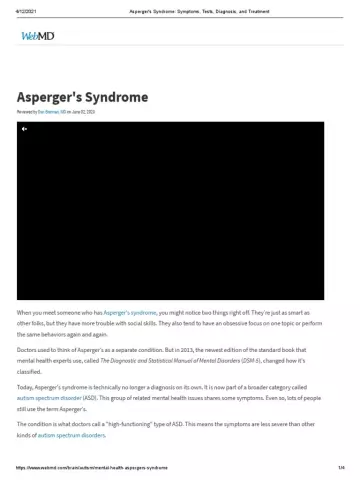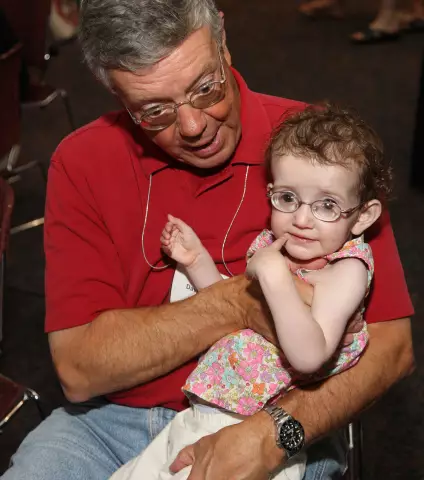- Author Rachel Wainwright wainwright@abchealthonline.com.
- Public 2023-12-15 07:39.
- Last modified 2025-11-02 20:14.
Asperger's Syndrome
Emotions are what makes us human. We express our feelings with facial expressions, gestures, intonation, and, perceiving these same signals, we judge the emotional state of others. Children with Asperger Syndrome have difficulty expressing emotions and have difficulty communicating with peers, preferring a small circle of interests and hobbies. It is believed that such famous people as Isaac Newton and Albert Einstein had this ailment. Below we will discuss the treatment and main symptoms of Asperger's syndrome.
Asperger's syndrome - symptoms
Asperger's Syndrome is a general developmental disorder characterized by difficulties in social interaction and limitation of the sphere of interests and practice of a small stereotyped repertoire. Outwardly, this disorder may resemble autism, but, unlike the latter, the ability to speak and cognize is preserved.
The symptoms of Asperger's syndrome are combined into a characteristic "triad":
- Communication disorders;
- Difficulty maintaining cooperation;
- Social imagination.

Communication disorders imply difficulties in understanding gestures, facial expressions and intonations, choosing topics for conversation. Children with Asperger Syndrome cannot start and end a conversation, do not understand jokes and metaphors, do not distinguish between the meaning of complex words and phrases, although they can use them.
Such guys have difficulty maintaining friendly relations, do not understand ethical norms, often exhibit incorrect behavior and seem withdrawn, indifferent, indifferent and alienated.
As for the imagination, for such children it is rich and varied, but it is rather difficult to demonstrate its results to others. They do not always understand the point of view of other people, they misinterpret their feelings, actions, thoughts. A characteristic feature of Asperger's syndrome: role-playing games are difficult, but logical games are well mastered.
In general, the disease is characterized by anxiety and anxiety during communication, obsession with hobby, the desire for order, unnatural speech, often all this is accompanied by sensory disturbances. If these signs are identified, it is worthwhile to test for Asperger's syndrome.
Asperger's Syndrome and Communication Difficulties
From birth to three years, for known reasons, there are no signs of Asperger's syndrome, but they appear by the time of socialization. Speech becomes monotonous and weakened, facial expressions - frozen, voice - quiet and harsh, and the range of interests is limited to a narrow set of monotonous activities. The child is characterized by active, but short-term attention, the gaze remains empty.
All these external manifestations leave their mark on the personality of the child. At a tender age, such a child may be overly calm or too irritable, has difficulty falling asleep and is capricious in food preferences. When it comes time to attend kindergarten, such kids have a hard time adapting to the team, do not want to part with their parents and are estranged from other children.
Experiencing stress during communication, children often get sick and, depriving of communication with peers for the duration of the illness, become even more alienated. As a result, the symptoms of Asperger's syndrome worsen by school.
At school, such children often become outcasts, and it is not difficult to understand why this happens. Not being able to express their emotions, schoolchildren with Asperger's Syndrome seem inadequate, selfish, callous to their classmates, which is not surprising given that such children react poorly to the touch of other people, avoid looking into the eyes of the other person, and do not accept other people's ideas. And although it may seem that they do not at all strive for social contacts, such children hardly endure loneliness.
Features of intelligence
Signs of Asperger's syndrome interfere with socialization, but they do not affect intelligence. In terms of mental development, such children not only keep up with the age norm, but also often exceed it. As a rule, their memory is phenomenal, and their knowledge of the world is truly encyclopedic, and yet in practice this knowledge is applied with difficulty.
As we have already noted, the range of interests of such children, as a rule, is limited, but thanks to the ability to concentrate on the little things in their favorite activities, they achieve overwhelming success. Usually they are impressed by subjects such as mathematics, philosophy, history, geography.
Children with Asperger's Syndrome are reluctant to communicate, but they do not have any problems with speech. They build grammatically correct sentences, but pronounce them in a monotonous and unnatural voice, and the speech itself may seem too bookish and formulaic. However, such children express their thoughts in writing much better than in conversation.
Motor skills and sensory features
Pedantry is characteristic of children with Asperger's Syndrome - they prefer an orderly life and routine, and any spontaneous interventions in their usual routine only provoke anxiety. This can be expressed in the fact that the child refuses to try new dishes, reacts painfully to various unexpected stimuli - bright light, the noise of cars, tactile contacts with other people.
If ordinary children are afraid of the dark, strangers, or do not want to be alone, then with Asperger's syndrome there are completely different phobias, such as fear of wind, rain, harsh sounds, etc. And, nevertheless, the instinct of self-preservation and the necessary caution in potentially dangerous situations are not peculiar to such children.
As for motor skills, children with Asperger's syndrome have difficulty developing coordination of movements. This is manifested in such simple operations as fastening buttons, tying shoelaces, for the same reason their handwriting suffers. In general, such children are clumsy, they may have a violation of gait and posture, there are stereotyped obsessive movements.
Asperger's syndrome test and treatment

It may seem that the signs of Asperger's are just the result of inappropriate parenting, but the disorder is actually related to certain changes in brain development. Possible causes of the disease include genetic predisposition, viral infections in the first months of pregnancy.
To diagnose the disease, the Asperger cider test, developed by psychologists at the Cambridge Center for the Study of Autism, is used, as well as other neuropsychological studies. However, sometimes quite emotionally adequate people also fall under the poll results. In addition to the test for Asperger's syndrome, methods of monitoring a child, questioning parents and teachers, as well as methods of neurological diagnostics are used, which make it possible to exclude organic damage to the brain.
There is no specific treatment for Asperger's syndrome. In mild cases, deviations are compensated by the work of teachers and psychologists. In complex ones, neuroleptics, psychostimulants and antidepressants are required, as well as trainings, physiotherapy exercises and classes with a speech therapist. As a rule, the problems of a child with Asperger Syndrome cannot be completely solved, but growing up, he can start a family and achieve great success in areas that interest him.
YouTube video related to the article:
The information is generalized and provided for informational purposes only. At the first sign of illness, see your doctor. Self-medication is hazardous to health!






